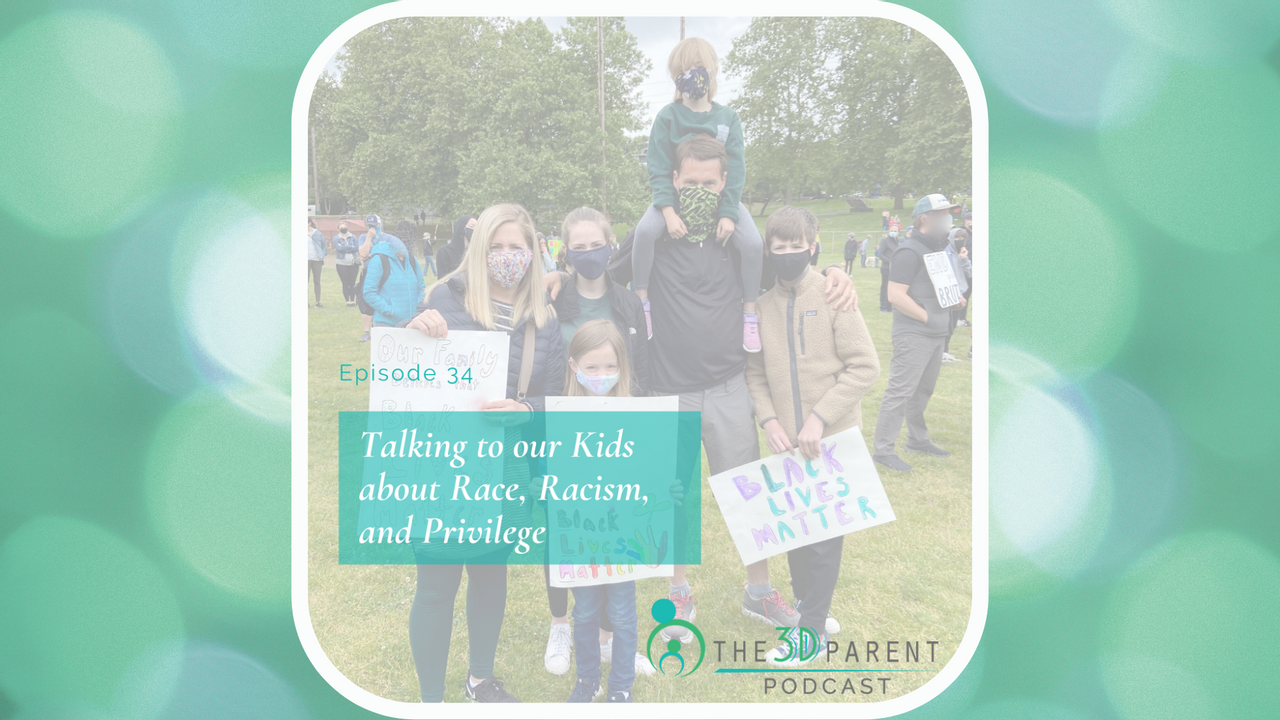Talking To Our Kids About Race, Racism, And Privilege
May 18, 2021
“It's okay to make mistakes when you're advocating or speaking out. And not everyone’s going to welcome your participation. That's okay. That's the price we pay for our privilege. Just listen, learn and continue to do the best you can to make a positive difference.”
This week on the 3D Parent Podcast, I am going to share six actionable steps that you can take right away to address race, identity, prejudice within your own families.
Some of the topics covered in this episode include:
- Common reasons why White parents choose to not to talk about race and prejudices (and how that choice is actually a privilege)
- The importance of intentionality when teaching kids about race, racism, and privilege.
- Six actionable steps that parents can start taking TODAY to effectively and appropriately address race, racism, and privilege within their family.
If you’re feeling intimidated or unsure of how to discuss the topics of race, racism, and privilege with your children, know that you are not alone. However, these conversations are necessary building blocks to a more just society. So I encourage parents to make a commitment to complete at least one step a week to genuinely address these difficult topics within your households.
Things You Will Learn

Episode Resources
- Explanation of what it is to be a white accomplice: https://www.whiteaccomplices.org
- PDF on what children understand about race from birth through age 6+:
- Five episode program for parents from Seattle’s King 5 News on race, racism, identity
- Harvard Implicit Association Test
- Children’s Book: Something Happened in Our Town: A Child’s Story About Racial Injustice by Marianne Celano PhD, Marietta Collins PhD, and Ann Hazard PhD. Here is a link to a YouTube read-aloud version.
- Children’s Book: A Kids Book About Racism by Jelani Memory. Here is a link to a YouTube read-aloud version.
- Website with book lists on police brutality, black heroes, recognizing privilege and more resources
- King 5 Series on Race and Parenting: “How we talk to our kids about race, racism and identity”
- http://www.willaplayschool.org
Quotes From Episode 34
“As a parent leading my family into becoming an ally to people of color, I have so much more to learn and frankly, to unlearn. This is a lifelong commitment for me and honestly should be for all white people who truly want to be a part of ending racial injustice in our world.”
“The biases that children form during their early age are largely influenced by verbal and nonverbal responses from adults. These are the things that we sometimes don't even notice that we do like walking a little faster when you walk by people of a certain race. Things of that nature. Kids pick up on those nonverbal cues.”
“Take the lead in starting the conversation about race and racism with your children. It's not enough just to tell your kids to be kind to everyone. These conversations need to be direct and explicit and about race and racism and privilege.”
“It's okay to make mistakes when you're advocating or speaking out. And not everyone’s going to welcome your participation. That's okay. That's the price we pay for our privilege. Just listen, learn and continue to do the best you can to make a positive difference.”
“Staying silent cannot be an option for us any longer. As White people, we have so much to learn and unlearn and so much to make right.”
“If you've committed to raising children who embrace diversity and aren't racist and do not contribute to contributors to oppression, you have to get ahead of the negative associations and biases and stereotypes that are perpetuated in our society. So do not be silent on the topics of racism with your children. You cannot waste any time here.”
Let's work together! I provide 1:1 support for parents motivated to make positive changing in their parenting and gain confidence and increase fulfillment in their role as parents. If this sounds like it might be what you've been looking for, book a free consultation today.
Stay connected with news and updates!
Join our mailing list to receive the latest news and updates from The 3D Parent.









